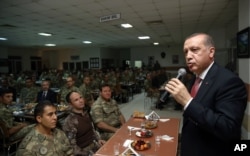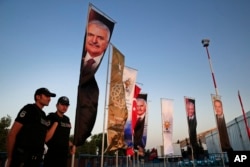When beer-drinking fans of a British rock band arrived at an Istanbul record shop earlier this month, some Muslim neighbors were so incensed about the perceived disrespect during the Muslim holy month that they attacked patrons.
“Are you not ashamed doing this in Ramadan?” one attacker screamed, according to amateur video taken of the incident.
The assault triggered street protests in the days that followed. The incident and fallout focused attention on what activists say is a growing problem of hate crimes and violence in Turkey during Ramadan, a month set aside by Muslims for peace and spiritual reflection,
“Every year, we witness attacks against those who do not fast in Ramadan,” said Turkish professor Aykan Erdemir, a senior fellow at the Washington-based Foundation for Defense of Democracies. “As long as systematic hate crimes are not tackled, intolerance and its conducive crimes will continue to escalate.”
Secular nation, religious agenda
Turkey is a secular country. But Islam is the largest religion in Turkey, with nearly 99 percent of the population being Muslim. Turkey’s president, Recep Tayyip Erdogan, has promoted a religious agenda that has angered many secularists.
“Using brute force to interfere is as wrong as organizing an event spilling onto the street during Ramadan,” Erdogan said, equating the record shop attacks with the demonstrations that followed.
Most Muslims fast from sunrise to sunset during Ramadan. And some Turks who do not fast are wary about how they conduct themselves, because they say they are often subject to both verbal and physical attacks. They often do not eat in restaurants during the day, they say, and conduct many social gatherings in private.
“You could not go around this neighborhood drinking alcohol,” said one young man who was attacked by an angry mob during the first night of Ramadan. He was with several university students shopping at an alcohol-and-tobacco store in Istanbul when the attack occurred. One student’s nose was broken, and several students sustained minor injuries.
The man, who did not wish to be identified, said he had not filed a formal complaint for fear of reprisals. Activists say most victims do not press charges.
Verbal abuse
Not all attacks during Ramadan are physical.
A female university student in Erzurum was verbally abused by two men last year because she was “smoking outside during fasting time,” according to news reports. The incident was recorded and widely shared on social media.
Turkish authorities often condemn the Ramadan violence, and several arrests have been made in connection with the record shop attack.
Turkey’s Presidency of Religious Affairs, or Diyanet, is an official Islamic institution whose duties, according to its website, include “making decisions on religious matters; expressing views and replying to questions on religion.” Halil Erdogan, a spokesman for the Diyanet, told VOA that the government never approves of Ramadan acts of violence.
“Fasting is a very important form of worship in Islam, but whether people will observe it or not is completely their free choice,” he said. “And no one has the right to pressure others to practice fasting or intervene in their realm of freedom.”
Police intolerance
Some victims say the police, too, can be intolerant.
Sergen Kay, a member of the left-wing Freedom and Solidarity Party (ODP), went to a hospital to see a friend who had been wounded in a bombing attack this month in Istanbul. Kay told VOA that he and his two friends were smoking in the garden of the hospital when two men approached them.
“We later learned that they were policemen in plainclothes,” he said. “They shouted at us, saying, ‘Are you smoking during fasting time?’ We started quarrelling. They called us terrorists. ... Then they detained us."
Kay was released from detention after a few hours, and no formal complaints were filed by either party, he said.






